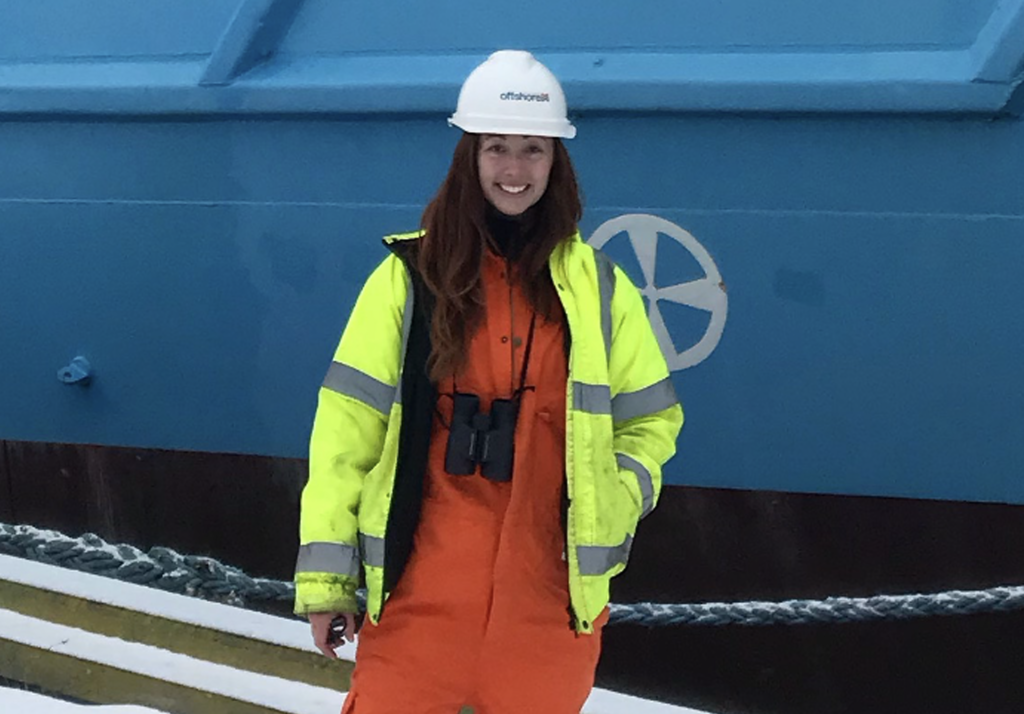
There are many positive stories in the media about women breaking the moulds of gender specific occupational stereotypes. Some of the world’s most influential leaders are women but, beyond just politics, we are seeing women pursue careers in science, technology, engineering and mathematics (STEM) and, in turn, making a huge impact on the evolving world in which we live. Stories about women working offshore, however, are few and far between. This is likely because there is still a very low proportion of female employees actively working in the field. Figures published last year show that a mere 3.5% of offshore workers operating on the UK Continental Shelf (UKCS) in 2016 were women (Oil and Gas UK, 2017), which actually represents a decline from previous years.
I am one of those 3.5%. I began my career in the offshore renewables industry as a marine wildlife intern back in 2011 and it, quite literally, blew me away. Wishing to have greater involvement within offshore wind farm development, I began working as a surveyor offshore and by 2016 had started operating for Offshore Marine Management (OMM) through the team at Offshore Marine People & Academy (OMPA), an agency that is based around training, development and providing experienced people to the offshore industry.
Over the last 18 months I have had a great experience working for OMM; they are a company who are passionate about providing women with a platform for personal career development in the offshore world, along with a wealth of invaluable global opportunities and experiences. Through the comprehensive training programmes at OMPA, accompanied with the support of experienced senior management, the working environment provided by OMM is one which is uniquely placed to help support the growth, development and confidence of its employees, whatever their gender.
Why is gender diversity offshore so important?
Although there is still a long way to go in terms of female representation in the offshore industry, there is a lot we can learn from the growing role of women within other STEM sectors. As of 2017, women made up 23% of those in core STEM occupations in the UK; an increase of 2% from the year before (WISE, 2017). That’s over 60,000 more women working in a multitude of STEM disciplines to bring new perspectives, ideas and creative concepts to the fore. Access to this available wealth of knowledge and experience is surely worth harnessing, isn’t it?
The evidence undeniably suggests that it is. Extensive research shows that gender diversity in the workplace can really give companies the edge; for example, MSCI found that gender diverse companies out-perform competitors an average of around 10% (Women on Boards, 2015). This will be increasingly important for businesses in the offshore sector in the coming years, as the evolving nature of the industry demands new ideas and perspectives to successfully implement solutions in ever-challenging environments.
Looking at the bigger picture, there will also be outside pressures to innovate from Government, as it looks to the renewables industry to play its part in meeting ambitious climate targets. A recent announcement by Clean Growth Minister Claire Perry MP that the UK is to review its long-term target to reduce climate emissions raises the likelihood that the UK could implement a “net zero” target by 2050.
Indeed, it is also understood that members of the UK offshore wind industry have committed to working with the UK Government on a transformative Sector Deal to deliver thousands of additional skilled jobs in coastal areas, with the aim of generating one third of the UK’s electricity from offshore wind by 2030. These skilled jobs will need to be filled by skilled people – both men and women – which may be an increasingly complex process post Brexit.
And beyond this, it is of course important in and of itself that women are given the best possible opportunities to access all sorts of employment opportunities, to have the life changing experiences that I have been so fortunate to have, some of which are uniquely provided by a career at sea.
For this to be achieved, it will be imperative that women working offshore are given a platform to encourage others, just as OMM have done for me, and that everyone in the industry, from senior management to asset operators, are willing to act on that message too. Because now more than ever, we need a diverse workforce on the water.
Recommended for you
